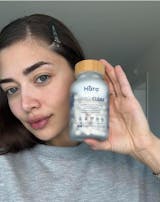Floaters in the eye can be an annoying and sometimes alarming phenomenon. If you've ever noticed small specks, threads, or cobweb-like shapes drifting across your field of vision, you've experienced floaters. While they are generally harmless, their appearance can be unsettling. One lesser-known cause of floaters is dehydration.
Understanding Floaters
Floaters are small, shadowy shapes that appear in your vision. They are caused by tiny clumps of gel or cells inside the vitreous, the clear, jelly-like substance that fills the inside of your eye. As we age, the vitreous becomes more liquid, and the microscopic fibers within it tend to clump together and cast shadows on the retina, creating floaters.
While floaters are often associated with aging, they can also be linked to other factors such as eye injury, inflammation, and, importantly, dehydration.
The Link Between Dehydration and Floaters
Dehydration occurs when your body loses more fluids than it takes in. This can affect various parts of your body, including your eyes. The vitreous is composed mainly of water, and when your body is dehydrated, the vitreous can lose water content, leading to shrinkage and pulling away from the retina. This process can create floaters.
Moreover, dehydration can exacerbate the symptoms of existing floaters. When the body is not adequately hydrated, the consistency of the vitreous can change, making floaters more noticeable and persistent.
Symptoms of Floaters Caused by Dehydration
Floaters caused by dehydration share many similarities with those caused by other factors, but there are some specific symptoms to be aware of:
- Increased Visibility of Floaters: You may notice floaters more frequently, especially when looking at a bright background like the sky or a computer screen.
- Eye Strain and Discomfort: Dehydration can cause your eyes to feel strained, tired, or uncomfortable. This can make floaters more bothersome.
- Dry Eyes: Dehydration often leads to dry eyes, which can exacerbate the visibility of floaters and cause additional discomfort.
- Headaches and Light Sensitivity: Dehydration can lead to headaches and increased sensitivity to light, making floaters more pronounced.
Prevention Tips for Floaters Due to Dehydration
Preventing floaters related to dehydration involves maintaining proper hydration and taking care of your overall eye health. Here are some practical tips to help you keep your eyes healthy and reduce the occurrence of floaters:
- Stay Hydrated
- Drink Plenty of Water: The most straightforward and effective way to prevent dehydration is to drink enough water throughout the day. Aim for at least 8 glasses (about 2 liters) of water daily, more if you are physically active or live in a hot climate.
- Monitor Your Urine Color: A simple way to gauge your hydration level is to check the color of your urine. Pale yellow urine generally indicates adequate hydration, while dark yellow or amber suggests you need more fluids.
- Consume Hydrating Foods
- Eat Water-Rich Fruits and Vegetables: Incorporate foods like cucumbers, watermelon, oranges, strawberries, and lettuce into your diet. These foods have high water content and contribute to your overall hydration.
- Limit Caffeine and Alcohol: Both caffeine and alcohol are diuretics, which means they can increase fluid loss. Try to moderate your intake of these beverages and compensate with extra water.
- Practice Good Eye Health
- Follow the 20-20-20 Rule: To reduce eye strain, every 20 minutes, look at something 20 feet away for at least 20 seconds. This practice helps reduce eye fatigue and discomfort.
- Wear Sunglasses: Protect your eyes from harmful UV rays by wearing sunglasses when you’re outdoors. This can also help reduce the glare that makes floaters more noticeable.
- Use Artificial Tears: If you experience dry eyes, using over-the-counter artificial tears can help keep your eyes moist and comfortable.
- Maintain a Healthy Diet
- Incorporate Omega-3 Fatty Acids: Foods rich in omega-3 fatty acids, such as salmon, flaxseeds, and walnuts, can support overall eye health and reduce inflammation.
- Include Antioxidants: Vitamins C and E, beta-carotene, and zinc are essential antioxidants for eye health. Include foods like carrots, sweet potatoes, spinach, and citrus fruits in your diet.
- Regular Eye Check-Ups
- Visit an Eye Specialist: Regular eye examinations are crucial for maintaining good eye health. An eye specialist can detect any changes in your eyes early and provide appropriate treatment if necessary.
- Monitor Changes: If you notice a sudden increase in floaters or flashes of light, seek medical attention immediately. These could be signs of a more serious eye condition, such as a retinal detachment.
Conclusion
Floaters in the eye can be a nuisance, and dehydration is a contributing factor that is often overlooked. By understanding the symptoms and taking proactive steps to maintain proper hydration and eye health, you can minimize the occurrence and impact of floaters. Remember to drink plenty of water, consume hydrating foods, practice good eye habits, and schedule regular eye check-ups to keep your vision clear and healthy.
By incorporating these prevention tips into your daily routine, you can reduce the frequency and severity of floaters and enjoy better overall eye health. Stay hydrated, take care of your eyes, and keep floaters at bay.


